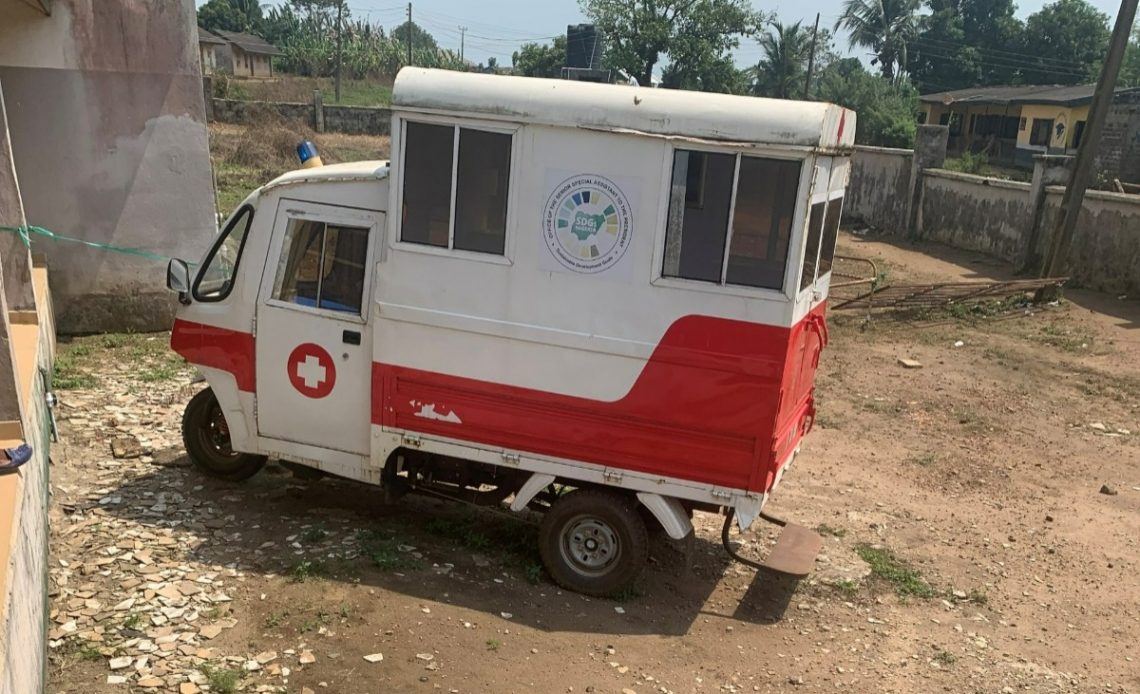Odeyinka Oluwatobi (Lead Writer)
Lookman Okikiola had worried about having another child after his first daughter was born in 2019. His wife Motolani’s water broke at midnight, weeks before her due date and there was no means to get her to the health centre at that time. In his confusion, a neighbour offered to call a popular “Iya Agbebi” (local unskilled birth attendant) who lived a few houses away from them in the Oni community of Ogun Waterside Local Government Area. According to Okikiola, he believed his wife would not have survived if he wasted time finding a taxi to take her to the hospital.
Five years later, she conceived again, but unlike the previous time, Motolani arrived at the Abigi Primary Health Centre early on her due date and waited, exercising and praying, until she was taken into the labour room. Some minutes into labour, she reportedly developed complications and needed to be transferred to Ibiade General Hospital, which is around five kilometres away. Okikiola believed what he feared was about to occur. “It was already past 7pm and it would be hard to find a cab to convey my wife to the general hospital”. Okikiola said.
But he did not have to go through such trouble, he was informed that there were tricycle ambulance services available at the health centre, and in a few minutes, his wife would safely give birth. Sure enough, by dawn of the next day, Okikiola cradled his second daughter.
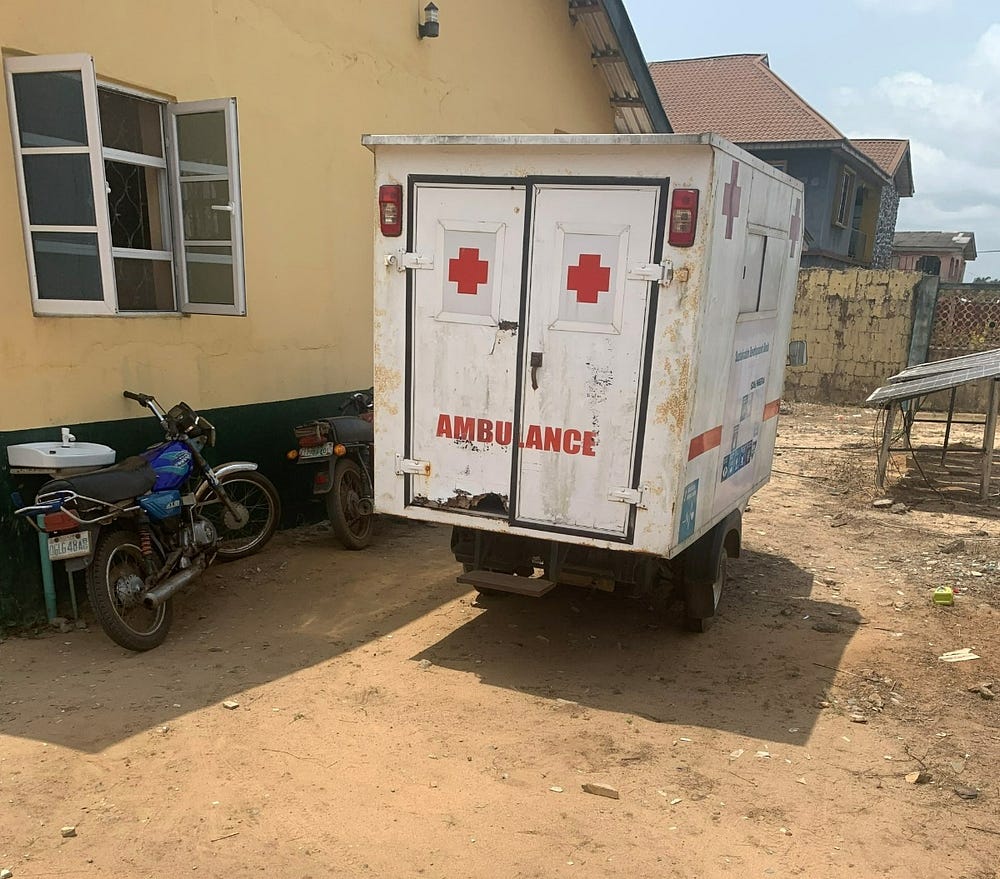
According to the 2018 Nigeria Demographic and Health Survey, Nigeria’s maternal and child mortality rates are among the highest in the world, with a ratio of 512 maternal deaths per 100,000 live births and 67 infant deaths per 1,000 live births respectively. Ogun State is estimated to have the highest incidence of child mortality in the Southwestern region, with 56 out of 1000 infants between the ages of zero and 11 months dying after birth. According to residents of the Agrarian communities of Ogun Waterside, some maternal deaths have been recorded in the hands of traditional birth attendants and in Primary Health Centres, which they attributed to the poor state of the PHCs, and particularly, the lack of emergency response systems.
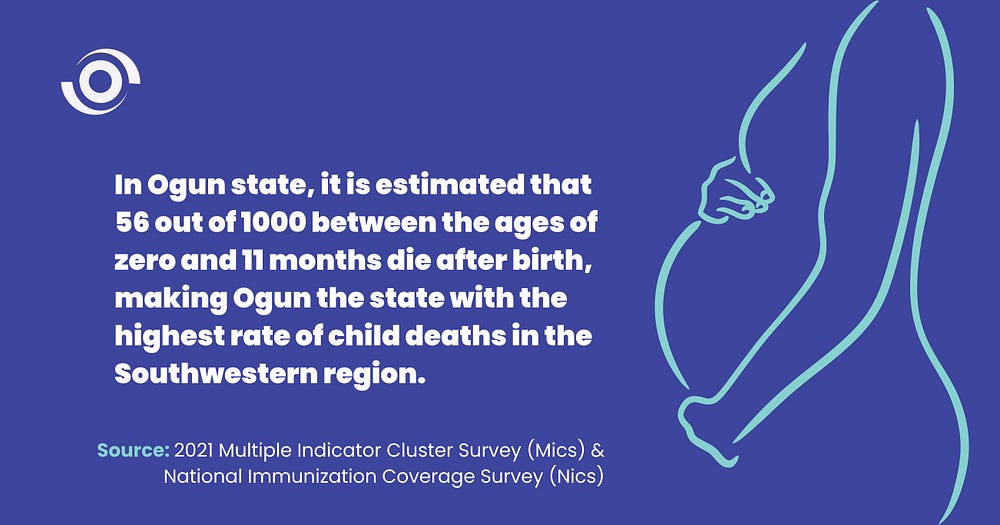
A resident, Wole Osodiran said that people had to find transportation to convey patients from their homes to PHCs and from PHCs to any referred hospital in Ibiade or Ijebu-Ode. In some cases, they had lost patients. “If you go to Abigi to deliver or with a serious illness, they rarely have a doctor available, so they refer you to Ibiade General Hospital or Ijebu-Ode, and you start looking for a cab or motorcycle to take you there,” he noted.
Succour came in 2021
According to the Honourable Commissioner of Health in Ogun State, Dr. Tomi Coker, 70 per cent of women who died during childbirth were mostly due to lack of access to interventions such as transportation from homes or PHCs to general hospitals.
As part of efforts to address the high rates of maternal and infant mortality in the state, the state government distributed 22 tricycle ambulances to Primary Health Centres across the state. PHCs in Ogun Waterside such as Abigi and Iwopin health centres received and put the tricycle ambulances to use. Residents confirm that they see the tricycle ambulances being used to convey patients, especially from the PHCs to Ibiade General Hospital.
Mr Okikiola and his wife testified to using the tricycle ambulance provided by Abigi PHC. Residents around the Iwopin PHC confirmed the claim by Mrs Lateef Adetutu, the head nurse in Iwopin that the ambulance is used frequently. “…and it is not just for pregnant women, we have had some cases of severe typhoid in recent times. We used the ambulance to take patients to Ibiade mostly. It has been helpful a lot.” Mrs Lateef said.
What’s Working
-
OMOMi is leveraging digital technology to provide women with easy access to quality maternal health care
An app is offering reproductive healthcare help to women in Nigeria who don’t always have access to reliable maternal and prenatal health information. While it does require the user to have access to technology, it has attracted 40,000 users so far, providing “pregnant women and mothers with access to life-saving maternal and child health information, as well as access to doctors with the touch of a button.” Read more
The tricycle ambulances deployed to Ogun Waterside also help health workers and the community residents to navigate the poor road networks in the communities, which speeds up emergency response times. Traditional ambulances, although absent, would have trouble navigating these areas owing to the poor road conditions, therefore the idea of the tricycles is very practical. The tricycle ambulances are smaller and can drive more readily over the uneven, unpaved roads, responding quicker to emergencies.
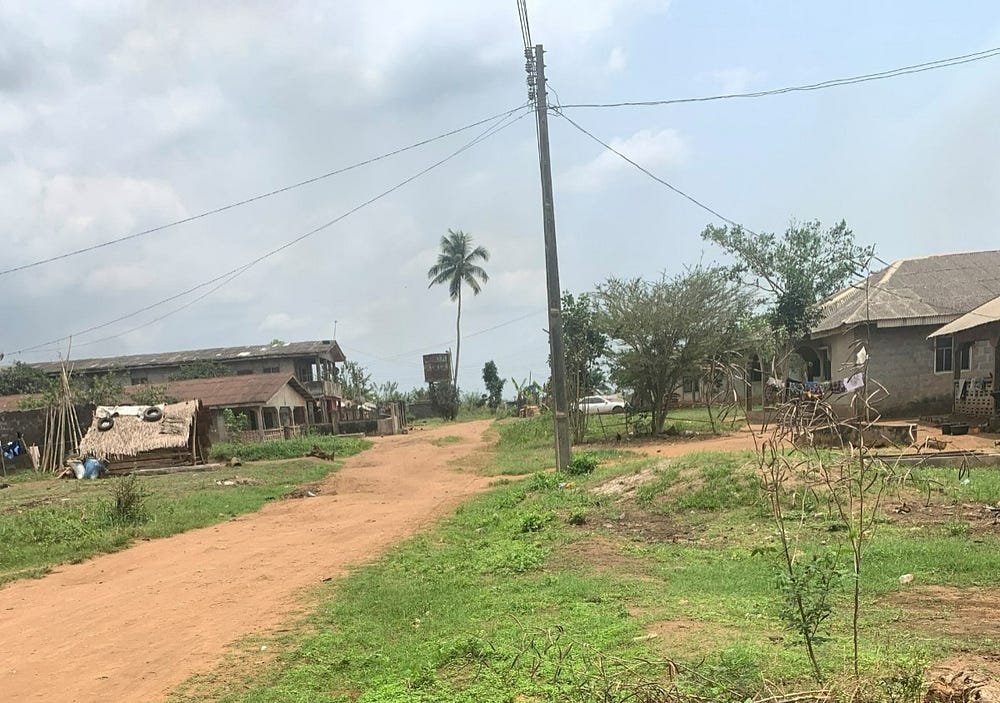
…but not much difference
But how much difference is this intervention making? Many residents of Ibiade say improvements in the service needs to be made. The nurses at the PHCs, Iwopin and Abigi revealed that the government did not employ drivers for them. In most cases, they depend on the security personnel to drive it during emergencies which sometimes causes delays.
They also noted that the intervention is not complemented by other efforts, like improved infrastructure and adequate personnel, to improve primary healthcare. Janet Ogunkayode, a Public Health Researcher at The Wellbeing Foundation Africa, noted that other factors such as a lack of quality antenatal education and care, patronage of traditional birth attendants, and lack of first aid and consumables in the ambulance may still contribute to maternal and infant deaths in the areas. “The government has done well in distributing the tricycle ambulances to the communities, and it is good to know that they are being used, but some crucial issues still need to be addressed. What is the general state of healthcare in this communities? The tricycle ambulances will only help them respond faster to emergencies, after responding, what kind of treatment do the patients get? Without addressing all these issues, the maternal and infant mortality rates of the state may not decline.” She said.
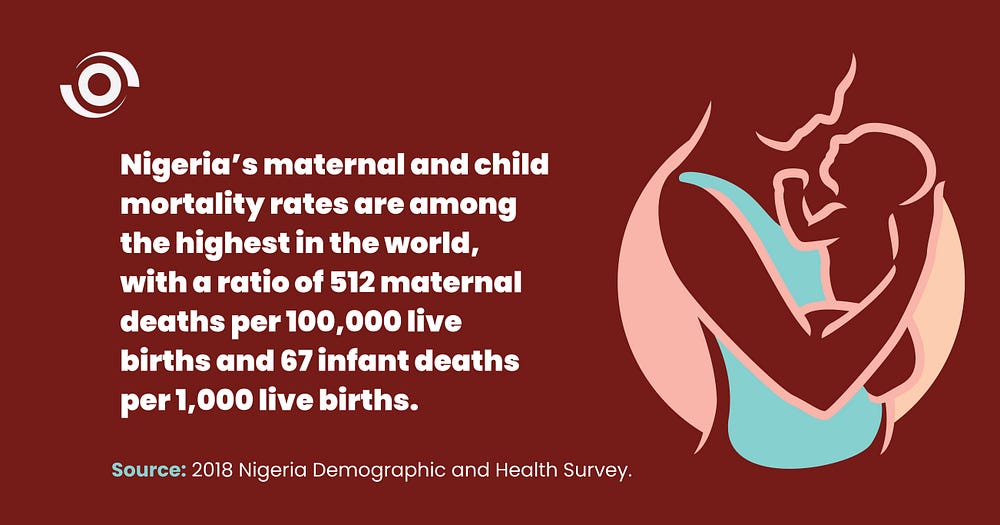
Ms. Ogunkayode further noted that the tricycle ambulances should not be limited to the PHCs alone, “It should be in strategic locations in the communities and people should know the emergency contacts to call, so that the ambulances can pick patients from their homes.”
Even if a tricycle ambulance is on standby to convey patients from Abigi or Iwopin Health Centres to Ibiade General Hospital, local residents say they lack adequate facilities. The Ibiade General Hospital does not have an ambulance (truck or tricycle) to transport serious patients that may require referral to a better-equipped hospital in Ijebu-Ode, Sagamu or Abeokuta. One of the nurses on duty at the Ibiade General Hospital confirmed that the hospital does get emergency cases from Abigi and Iwopin health centres, however, it does not have an ambulance to respond to emergencies or convey severe cases to better equipped hospitals.
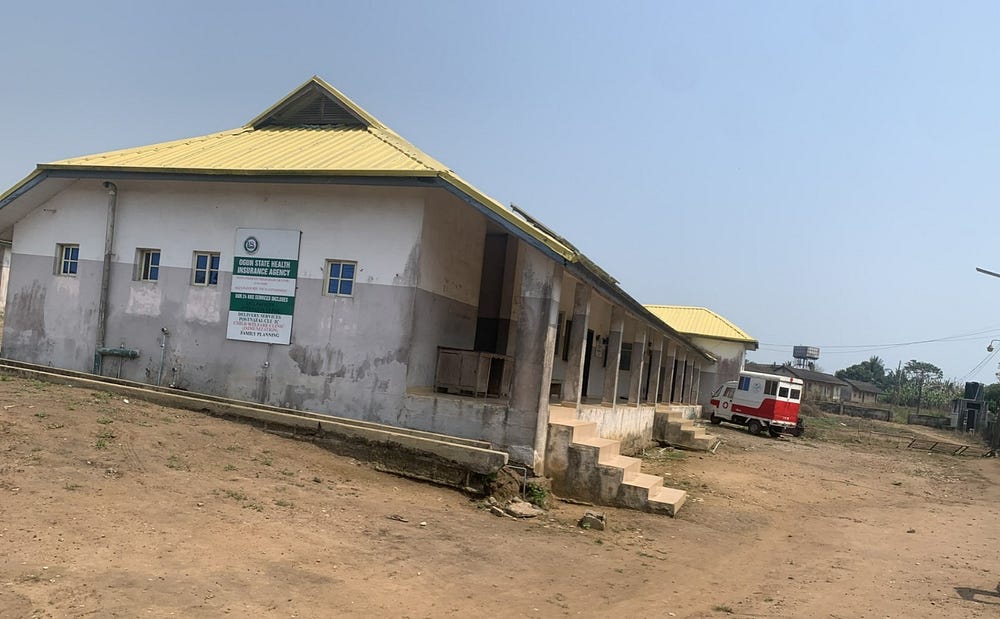
Due to a lack of data, it is difficult to quantify the impact of the tricycle ambulances in the facilities especially in saving the lives of pregnant women, but findings show that similar interventions have been effective in other parts of the world. Motorcycle ambulances, for example are equipped with side carriages and medicines, as well as a complete first-aid kit, to meet the emergency needs of residents in the rural Narayanpur area of Chhattisgarh, in central-east India. According to UNICEF, the initiative, whose implementation was monitored between 2014–2016, helped the state to significantly reduce its maternal mortality from 173 to 141 deaths per 100,000 live births, over the monitored period, as well as increase the frequency of institutional deliveries.
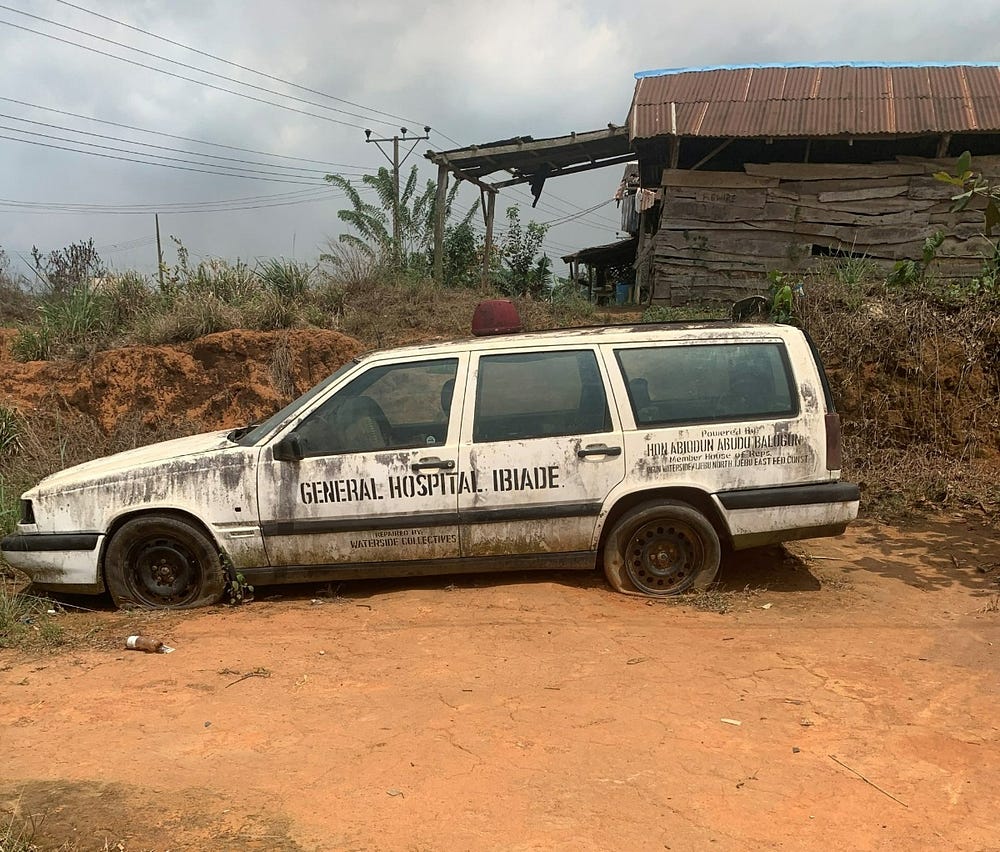
Abdulhammed Babatunde, a public health innovator, praised the use of tricycle ambulances in Ogun Waterside as “a step in the right direction” and urged other states with similar challenges to adopt the initiative. However, although the initiative has the potential to increase access to emergency care, the state government must improve its effectiveness by assigning specialised drivers to each tricycle and expanding its reach to other health facilities in the state.


